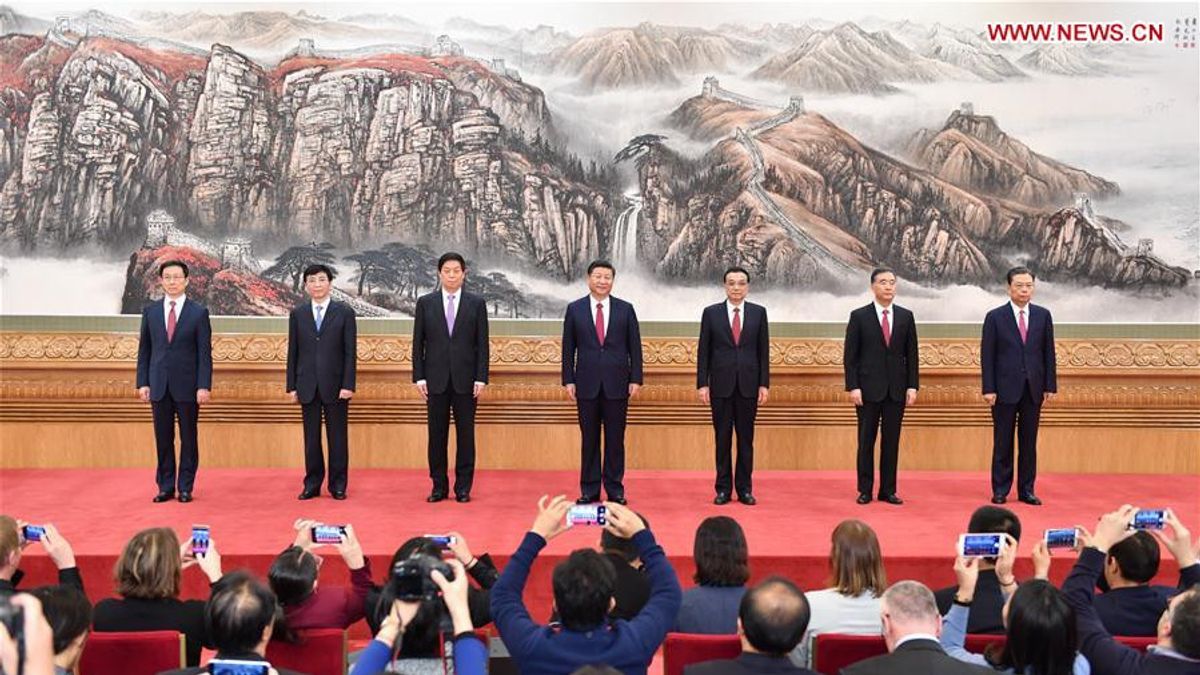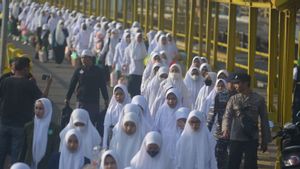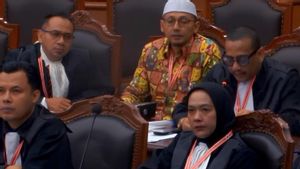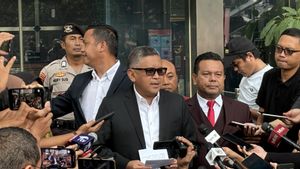JAKARTA - Xi Jinping was re-elected as Secretary General of the Chinese Communist Party (CPC), while holding the post of President of China for a third term, with a number of loyalists entering the country's highest governing body.
Xi Jinping's re-election made him China's most powerful ruler since the era of Mao Zedong, as reported by Reuters on October 24. Xi also reshuffled members of the Politburo Standing Committee, the country's highest body to be side by side for the next five years.
The chairman of the Shanghai Communist Party Li Qiang was one of the committee's new members introduced at the People's Great Hall, Beijing, Sunday, putting him in line to become prime minister when Li Keqiang retired in March.
Other new members of the seven members were Cai Qi, Ding Xuexiang and Li Xi. Meanwhile, Zhao Leji and Wang Huning were members of the previous committee. The six of them became committees with Xi Jinping.
Everyone selected seen by analysts has a loyalty close to Xi. Richard McGregor, senior researcher for East Asia at the Lowy Institute think tank in Sydney, Australia, said the result was a brilliant victory for Xi.
"All of its rivals, potential and real, have been forced out of the Politburo Standing Committee and Xi loyalists replace them. The new politburo is a firm statement about Xi's dominance over the party," McGregor said.
Xi was elected by acclamation in the CPC 20th Congress, promising a more open China and admitting the country cannot develop just by self-isolating.
"We will open the door wide again. China's prosperity will create more opportunities for the world," Xi said as quoted by Antara.
However, 69-year-old Xi faces tough challenges as the world's second-largest economy slows down and frustrations over its zero-COVID policy grows. China is also increasingly segregated from the West, exacerbated by Xi's support for Vladimir Putin from Russia and rising tensions over Taiwan.
"This is a leadership that will focus on achieving Xi's political goals, rather than pursuing their own agenda for what they think is best for the country," said forced Thompson, senior guest researcher at Singapore's Lee Kuan Yew National University. Public Policy School.
"There is only one right way to rule, and that is Xi's way," he said.
As expected, the new composition of the Standing Committee is not a clear successor to Xi. The rise of Li Qiang (63) to second place, meanwhile, talked about the importance of the relationship with Xi.
As chairman of the Shanghai party, Li is a lightning rod for some public anger, which managed to bypass censors over the city's two-month lockdown of COVID-19 earlier this year.
But not only that, Li and Xi share a long history, including Li's duties as Xi's chief of staff when the Chinese leader became chairman of the party in Zhejiang Province.
Another new permanent committee member is Xi's personal secretary and gatekeeper, Ding Xuexiang (60), the youngest committee member. Ding heads the Central Committee General Office, which manages top leadership administration affairs.
Meanwhile, Cai Qi, 66, joined the Standing Committee of his position as chairman of the Beijing party and is considered one of Xi's closest political allies, having worked with him for 20 years in the coastal provinces of Fujian and Zhejiang.
The fourth newcomer is Li Xi (66), the party leader from Guangdong Province who is also considered ideologically close to Xi, although they have no history of cooperation like the others.
The reshuffle came a day after Li Keqiang and Wang Yang, seen by analysts as relatively moderate young to serve longer in top decision-making agencies, were removed from the wider Central Committee. Both have ties to the Communist Youth League, a once influential group that experts say has lost power under Xi.
Another striking change from Sunday's reshuffle was Hu Chunhua, deputy prime minister who has been considered by several party observers as prime ministerial candidates, also having the roots of the Youth League. Hu (59), was not chosen to return to Politburo.
Another change is, the only woman in the last two periods in Politburo, Sun Chunlan, was not re-elected to enter the highest institution.
Xi laid the groundwork for ruling more than a decade, when he removed the two presidential terms in 2018. His term as president is likely to be updated at the annual parliamentary session in March, where the next prime minister will also be officially appointed.
Xi's full control means his team will take full responsibility for any policy errors," said Yang Zhang, assistant professor at the University of America's School of International Services in Washington.
"The autocracy can provoke stronger international rejections from US-led Western countries. All of these scenarios will make the third and fourth term not as easy as expected," he said.
The English, Chinese, Japanese, Arabic, and French versions are automatically generated by the AI. So there may still be inaccuracies in translating, please always see Indonesian as our main language. (system supported by DigitalSiber.id)













